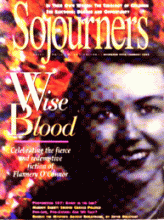Some of my fondest memories and most formative experiences in a United Methodist congregation are those that came from participating in a small peace mission group, just like the ones Richard Taylor describes in Peace and Justice Ministry: A Practical Guide. These settings are crucial to our journey of discipleship.
Taylor's presentation is practical, as the subtitle indicates, but it is more: It is biblical, thorough, realistic, and compelling as well. His approach is consistently rooted in prayer and respect for all people.
Four chapters and two appendices attend to the questions, What is a peace and justice ministry, how do I start one in my church, how do we make it grow, and what kinds of things can and should we do? Woven throughout these practicalities are the scripture references that keep groups rooted and focused.
You can literally start a new group, or in the words of the sub-subtitle, "make an existing one more effective," with just this book and a Bible. Each chapter contains important clues to make that possible, based on Taylor's extensive organizing and training experience.
In chapter one, for example, included in the list of "seven key characteristics of a peace and justice ministry" are such items as fostering friendship and promoting reconciliation among group members. Taylor advocates viewing the small group as a place to practice what we preach.
In chapter two, on how to start a group, Taylor wisely includes as step one a recommendation to founding members that they look at their own calling and motivation for starting a group. More responsible leadership will come from those who've examined and prayed about why they're involved.
Chapter three, on helping the group grow, is where Taylor takes up the inevitable problem of conflict in the group.
Read the Full Article
